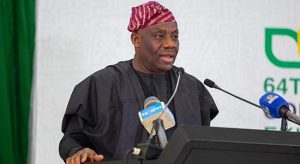
President Bola Ahmed Tinubu‘s government has declared the enhancement of 38 federal and state technical colleges throughout Nigeria as part of extensive reforms intended to equip young Nigerians with skills that are competitive on a global scale.
During his address on Monday at the 2025 Quarterly Citizens and Stakeholders Engagement regarding the Nigeria Education Sector Renewal Initiative (NESRI) in Abuja, the Minister of Education, Dr. Tunji Alausa, stated that these upgrades form part of a larger strategy to reorganise the education system towards a skills-oriented, knowledge-based economy.
The engagement session centred on key strategic priorities, the introduction of important initiatives, and tackling ongoing issues, particularly the significant number of children not attending school.
Alausa detailed six main priority areas within the ministry’s reform agenda, which include decreasing the number of out-of-school girls, boosting quality assurance efforts, and enhancing access through targeted national initiatives.
He also emphasised the launch of a dual-training approach in the updated technical colleges, where students will dedicate 80% of their time to practical training and 20% to classroom learning—this change aims better to equip them for the realities of the job market.
Naija News reports that NESRI, which is the cornerstone of the reform, encompasses initiatives focused on improving literacy, reforming the curriculum, and digitising data, with the goal of shifting Nigeria from a resource-dependent economy to a knowledge-based one.
Alausa said, “Artisans will be paid to mentor trainees, establishing a new value chain in the education sector.
“Our goal is to train 5 million young Nigerians with globally relevant skills within four years.
“NESRI addresses issues of access, quality, inclusivity, research, and professional development in education.”
The minister highlighted that Nigeria presently has 15 million children who are not enrolled in school and more than 45 million who are considered to be learning disadvantaged.
He emphasised that adolescent girls, especially the 6 million aged 12 to 19 who are currently out of school, are a primary focus of the reforms.
To combat this issue, the minister reported that 25,000 children have been incorporated into formal education through the NESRI initiative, and 4,000 Tsangaya teachers have received training to promote inclusive education.
Alausa also announced that the National Examinations Council and the West African Examinations Council will commence computer-based testing in November 2025, with a complete digitisation of all national examinations, including the Joint Admissions and Matriculation Board (JAMB), expected by 2027.
He stated that this initiative aims to address examination malpractice and improve the integrity of the examination process.
The post Tinubu Govt Upgrades 38 Technical Colleges In Nigeria, Unveils New Learning Method appeared first on Naija News.


